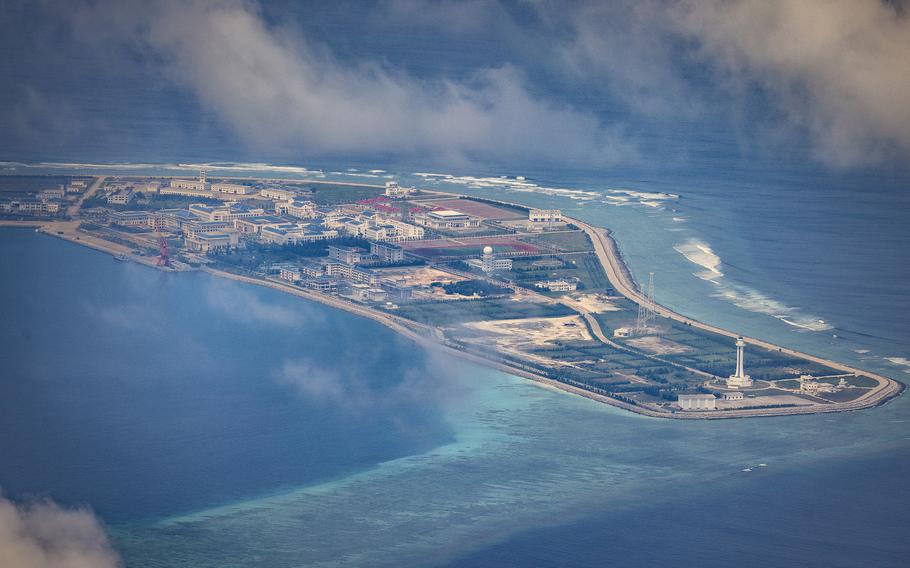
Buildings and structures are seen on the artificial island built by China in Subi Reef on Oct. 25, 2022, in Spratly Islands, South China Sea. China has progressively asserted its claim of ownership over disputed islands in the South China Sea by artificially increasing the size of islands, creating new islands and building ports, military outposts and airstrips. (Ezra Acayan, Getty Images/TNS)
(Tribune News Service) — China is building up several unoccupied land features in the South China Sea, according to Western officials, an unprecedented move they said was part of Beijing’s long-running effort to strengthen claims to disputed territory in a region critical to global trade.
While China has previously built out disputed reefs, islands and land formations in the area that it had long controlled — and militarized them with ports, runways and other infrastructure — the officials presented images of what they called the first known instances of a nation doing so on territory it doesn’t already occupy. They warned that Beijing’s latest construction activity indicates an attempt to advance a new status quo, even though it’s too early to know whether China would seek to militarize them.
Fishing fleets that operate as de facto maritime militias under the control of authorities in Beijing have carried out construction activities at four unoccupied features in the Spratly Islands over the past decade, according to the officials, who asked not to be identified to discuss sensitive information. Some sand bars and other formations in the area expanded more than 10 times in size in recent years, they said.
Satellite photos shared with Bloomberg News depicted what they said was a Chinese maritime vessel offloading an amphibious hydraulic excavator used in land reclamation projects at Eldad Reef in the northern Spratlys in 2014. New land formations have since appeared above water over the past year, according to the officials, who said that images showed large holes, debris piles and excavator tracks at a site that used to be only partially exposed at high tide.
They said similar activities have also taken place at Lankiam Cay, known as Panata Island in the Philippines, where a feature had been reinforced with a new perimeter wall over the course of just a couple of months last year. Other images they presented showed physical changes at both Whitsun Reef and Sandy Cay, where previously submerged features now sit permanently above the high-tide line.
Asked to respond to the claims, China’s Foreign Ministry in Beijing said: “The relevant report is purely made out of thin air.”
China asserts rights to more than 80% of the South China Sea based on a 1947 map showing vague markings that have since become known as the “nine-dash line.” It has previously said it has the sovereign right to build upon its own territory.
Tensions between China and other claimants in the South China Sea — the Philippines, Taiwan, Malaysia, Indonesia, Vietnam and Brunei — have been rising for years as Beijing invested more in naval and coast guard ships to enforce its claims. The Spratly Islands, historically tiny and uninhabited, have taken on greater geopolitical significance given they straddle one of the world’s busiest shipping lanes and could have military significance, particularly if tensions over Taiwan trigger a regional war.
China’s actions have prompted other nations in the region to step up defense spending and also undertake reclamation work. Vietnam expanded dredging and landfill work at several of Spratly outposts this year, according to a report this month by the Asia Maritime Transparency Initiative.
The Philippines this month protested Chinese vessels swarming two reefs nearby Reed Bank, a disputed area where both nations have discussed a possible joint oil and gas exploration plan. Last year, the Philippines also amassed vessels at Whitsun Reef, located about 175 nautical miles west of the nation, after more than 200 Chinese militia ships were spotted in a similar swarming maneuver.
Long before the recent surge in tensions, Beijing signed a non-binding “declaration of conduct” with Southeast Asian nations in 2002 that called on parties to refrain from “inhabiting on the presently uninhabited islands, reefs, shoals, cays and other features.”
In 2016, a United Nations-backed international tribunal ruled in a case brought by the Philippines that China’s claims had no legal basis. China dismissed the ruling, saying the tribunal had no jurisdiction, and continued to send thousands of “fishing” ships to disputed land features.
The U.S. has repeatedly criticized China’s actions in the South China Sea, and sought to challenge its territorial claims with so-called freedom of navigation operations.
U.S. Secretary of Defense Lloyd Austin said this month the U.S. is building a more lethal force posture in the Indo-Pacific as part of efforts to make sure China doesn’t dominate the region.
China is “the only country with both the will and, increasingly, the power to reshape its region and the international order to suit its authoritarian preferences,” he said on Dec. 3. “So let me be clear — we’re not going to let that happen.”
Bloomberg News writers Zibang Xiao and Philip Glamann contributed to this report.
©2022 Bloomberg L.P.
Visit bloomberg.com.
Distributed by Tribune Content Agency, LLC.